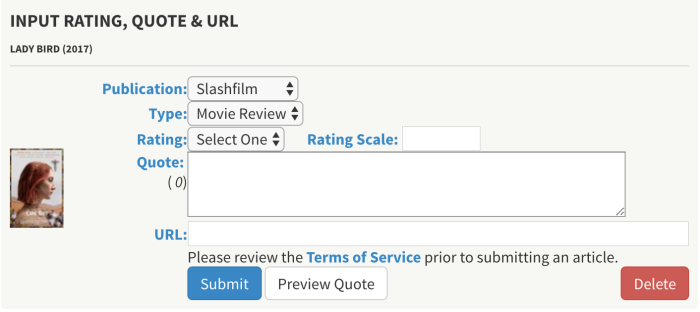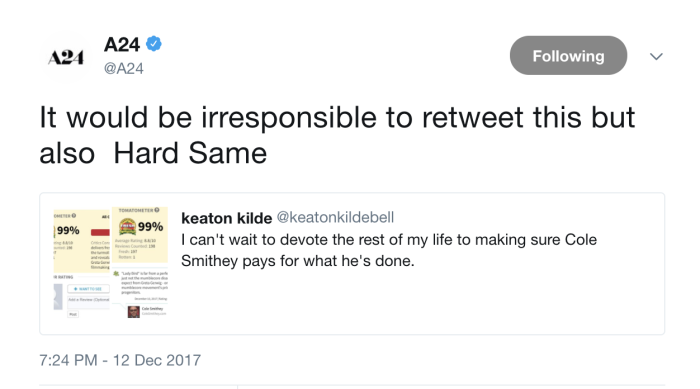The Strange Case Of 'Lady Bird' And Rotten Tomatoes (Or: Why We Should All Just Calm Down)
(Welcome to The Soapbox, the space where we get loud, feisty, political, and opinionated about anything and everything. In this edition: why we should all step back and take a deep breath before we continue talking about the Lady Bird Rotten Tomatoes score.)
Welcome to another day of Rotten Tomatoes scandal! The recent dethroning of Greta Gerwig's Lady Bird from its vaulted position of "best reviewed movie on Rotten Tomatoes" has caused a bit of an uproar. People are upset that one critic could come along and rate the film Rotten instead of Fresh, bringing the 100% grade down to a still-impressive 99%. Is this outrage warranted? Or might everyone benefit from calming down a little? Let's talk about the Lady Bird Rotten Tomatoes drama.
There's a scandal brewing around the Rotten Tomatoes score of Greta Gerwig's coming-of-age drama Lady Bird. As far as scandals go, this one is not very serious. That said, it has people talking. Up until recently, Ms. Gerwig's acclaimed drama was on its way to being the best-reviewed film on Rotten Tomatoes, coasting by with a 100% score. Even the almost dependably contrarian Armond White gave it a positive review! Everything was coming up roses for the latest indie darling from the good folks at A24.
And then along came critic Cole Smithey. Smithey rated Lady Bird with a B- on the review aggregator site, which really isn't that bad of a grade. But here's the twist: he also gave the film a "Rotten" rating. Here's how Rotten Tomatoes works: when a critic uploads his or her review, they're given several options. Allow me to peel back the curtain here and show you what that looks like:
As you can see, there are several fields to fill out. Publication where the review is originally from, what type of review it is (movie review, DVD review, etc.), rating (with the only two options being Fresh or Rotten), rating scale, a pull quote and a link to the original review. So while Smithey was able to provide his rating scale of a B-, he was also given the option to select Fresh or Rotten under rating. In fact, Rotten Tomatoes won't let you submit the review unless you select one of the two options.
Smithey's decision to rate Lady Bird rotten brought the film's Rotten Tomatoes score down from 100% to 99%. In all honesty, there's not much here to be upset about: 99% is still an incredible, overwhelmingly positive score. But the denizens of Film Twitter, and even A24 themselves, haven't taken kindly to this decision.
When the news of this was coming to a head yesterday, I remained mostly neutral. For one thing, I haven't seen Lady Bird yet (sorry!), so I don't have much of a dog in this fight. For another thing, as a film critic, I think it's bad form to gang-up on a critic because he or she doesn't care for a certain film. Case in point: when film critics on Rotten Tomatoes dared to give Christopher Nolan's The Dark Knight Rises a negative review, "fans" issued death threats. This is a whole lot of bad business, folks, and it's not a good look overall.
That said, Smithey decided to muddy the waters even more with a statement on Twitter.
Context is everything. I had to consider whether to cast "Lady Bird" as Fresh or Rotten in the context of a perfect score that people were using to trumpet "Lady Bird" as the all-time best reviewed movie on RT. A "B-" does not an "A+" make. @RottenTomatoes @LadyBirdMovie pic.twitter.com/fR7PJ5GfZD
— Cole Smithey: The Name Above The Title 📽️ (@colesmithey) December 13, 2017
At this point, most of the sympathy I had previously has gone out the door. I still maintain it's a bad idea to gang-up on a critic for not liking a movie, but in this case, Smithey is openly admitting that he graded the film Rotten out of spite. In his own words, he took umbrage with the fact that people loved Lady Bird so much, decided that love wasn't warranted, and then decided to throw a wet blanket on the situation.
Erik Davis, who works for Fandango (which is owned by the same owners of Rotten Tomatoes), pointed out that in Smithey's history of reviews, he gave all other B- rated films a Fresh score, which all but confirms he took specific issue with Lady Bird.
Smithey says "I had to consider whether to cast Lady Bird as Fresh or Rotten in the context of a perfect score," but that's not a critic's job, at all. There's plenty of context to consider when reviewing a film – production history, casting, general film composition, and on and on – but "worrying about what everyone else graded the film" is not on the list. Not even close.
But here's the thing: even if you don't like this decision, it's Smithey's decision to make. Is it spiteful? Sure. Is it perhaps mean-spirited? Maybe. Do you have to like it? Hell no. But that doesn't mean we, as a community of film goers, should act as if this is a miscarriage of justice. And maybe, just maybe, everyone should calm down. Just a smidge.
But it's not just Film Twitter who are taking issue with this decision – even members of the film community are a little up in arms. Filmmaker and producer Judd Apatow took to Twitter to call Smithey's decision out:
This is what people don't get about rotten tomatoes. Tons of reviewers are just people with computers who send stuff out onto the internet. Pay attention to the serious reviewers you trust not a number. https://t.co/x4Op8o2Xdj
— Judd Apatow 🇺🇦 (@JuddApatow) December 13, 2017
Now, part of what Apatow is saying here is true: "Pay attention to the serious reviewers you trust not a number." This is absolutely, 100% correct. People put too much stock into Rotten Tomatoes as the be-all, end-all for films. Rotten Tomatoes is a tool; it's a system that gathers up reviews and awards them a grade based on how Fresh or Rotten a film is rated. This is a good guiding system to sample the critical consensus of a film, but it's not the last word. I can't believe I have to say this, but apparently I do: it's okay if a critic, or even a group of critics, dislikes a film you love. Hell, there are a plethora of films that lots of people downright hate that I proudly regard in high esteem.
Here's an example from this year alone: A Cure For Wellness currently sits with a Rotten 41% grade on Rotten Tomatoes. Many critics really didn't care for this film. But I did. I think it's a bold, weird, audacious studio picture that has the guts to take chances, and I salute it for that. Am I going to throw a fit because some of my colleagues don't like it? Nope! Because, and I say this with all due respect, their opinion on this film doesn't matter as much as mine. In fact, being one of the few people who freely admits they like A Cure For Wellness makes the film seem even more special to me.
If I enjoy a film that others loathe, I'm not going to apologize for it. The same thing goes for a film that others love and I don't care for. Here's an example of that: my fellow critics went nuts for Richard Linklater's Boyhood. Some even called it one of the best films of the 21st century. Here's what I think of Boyhood: it's okay. I don't love it, I appreciate the unconventional way that Linklater made it (shooting it over a period of years with the same cast aging before our eyes), but I'm fairly confident I will never watch the movie again as long as I live. I feel no shame admitting this. Because film criticism is subjective. It always has been, and it always will be.
That said, Apatow's statement, "Tons of reviewers are just people with computers who send stuff out onto the internet," is a bit of a head-scratcher. I'm not really sure what he's getting at here: are critics supposed to file their reviews by Pony Express instead of computers? Is this a shot at us low-level online journalists who can't hold a candle to our print-based cousins? You can miss me with that, please and thank you.
In the end, Mr. Smithey's decision to grade Lady Bird Rotten because he felt that it shouldn't be considered a "perfect" movie is silly, but it's his silly decision to make. You can be angry about it, but I would urge you to also take a step back and breathe. If you loved Lady Bird, nothing can take that away from you. Especially not one person's negative review in a sea of otherwise positive reactions. I'd also argue that maybe, just maybe, this backlash reaction is exactly what Smithey was hoping for. The best recourse would be to shrug his odd Rotten rating off, and enjoy Lady Bird for yourself.

